High on the Hill
From Snoop and Dre, to Meth and Red, to Berner, Cudi and Khalifa — many rap icons have made Cannabis an integral part of their music and personas throughout the years. But when it comes to the true OGs of reefer rhymes, the musical godfathers of the modern marijuana movement, none can compare to the “Cheech and Chong of hip-hop,” Cypress Hill.
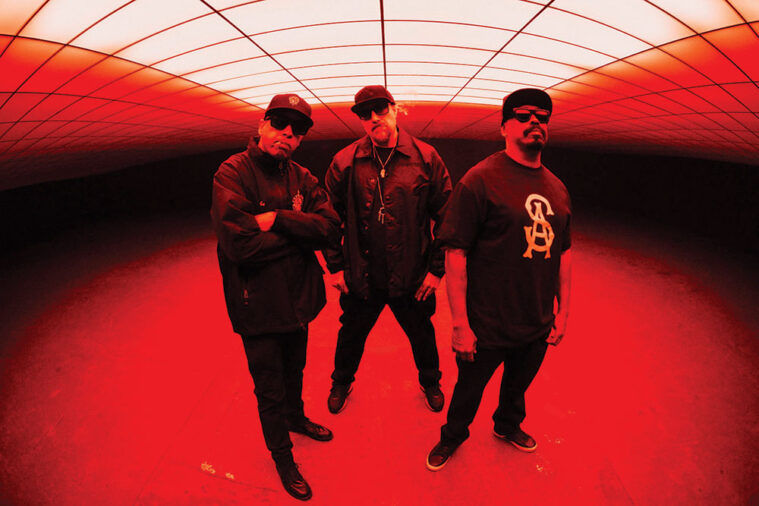
Born to Get Busy
The story of Cypress Hill begins in the early 1980s in the LA suburb of South Gate, where two Cuban-American teenagers named Senen Reyes and Louis Mario Freese first met while attending nearby Bell High School and forged a fateful friendship. Reyes reportedly gave Freese (five years his junior) his first joint when he was around 13, and the two became instant stoney homeys — cutting school, smoking “Buddha,” reading High Times and listening to Public Enemy records together. Adopting the MC monikers “Sen Dog” and “B-Real,” they dreamed of becoming famous rappers… but it wasn’t until after connecting with an Italian-American DJ from Queens, NY, named Lawrence “DJ Muggs” Muggerud in 1986 that their pipe dream began to come into focus.
Originally, it was Sen and his brother Sergio, aka Mellow Man Ace, who formed a group with Muggs called DVX (Devastating Vocal Excellence). But when Ace went solo, B-Real stepped up, prompting the group to change its name to Cypress Hill — inspired partly by a reference in the “Wild Style” movie soundtrack and partly by a street Sen lived on called Cypress Avenue. With Muggs as their DJ/producer, they began writing and recording songs, developing their own unique, Latin-infused hip-hop sound. Sen’s vocals were deep, raw and gruff, while B, on the other hand, had a distinctively high-pitched, nasal style. As for their lyrics, they were primarily inspired by two things: their hard times in the hood (both Sen and B had spent time gangbanging with the Bloods) and their love of weed.
“When we first started Cypress, we weren’t even writing about weed — it was Muggs that had the vision,” Sen told DJmag.com in 2021. “He told me one day, ‘You and B-Real need to be the Cheech and Chong of hip-hop. You guys are the two biggest stoners I know. You read High Times like it’s the Bible. You guys are great rappers, but you don’t have something that you’re known for. And it’s been under your nose the whole time!’”
Something for the Blunted
The trio put together a six-track demo tape and began shopping it around. They received offers from a few labels but turned them down due to the censorship that would’ve been imposed on them.
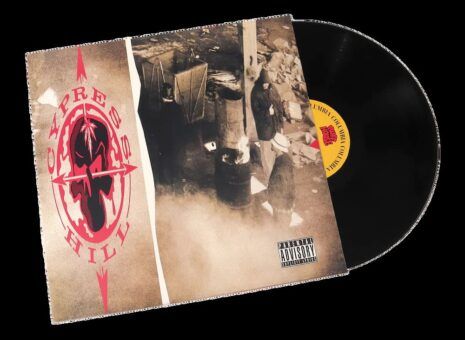
“They thought we were good entertainers,” Sen told Medium in 2016. “They just … didn’t want us to rap about weed, didn’t want us to cuss in our songs, didn’t want us to use the word ‘nigga,’ didn’t want us to talk about violence…”
Ultimately, in 1990, they signed with Philadelphia-based Ruffhouse Records (a subsidiary of Columbia/Sony), which offered total creative freedom. This resulted in their 1991 self-titled debut — a groundbreaking album that combined Spanish slang and sirens with beats and melodies sampled from diverse genres, including rock, soul, jazz and funk. But the most distinctive aspect of the album was its heavy emphasis on marijuana. Not only did most of the songs have weed references, but three songs (“Light Another,” “Stoned is the Way of the Walk,” and “Something for the Blunted”) were dedicated entirely to getting high. They even adopted a skull with an inverted pot leaf as their logo, which is featured prominently on the cover.
Surprisingly, rather than discouraging their pot proselytization, Sony actually leaned into it, running a full-page ad for the album on the back cover of the band’s beloved High Times (Dec. 1991). A few months later in the March 1992 issue, High Times bumped them up to the front cover, running a feature interview with them that included a photo essay in the centerfold entitled “How to Roll a Blunt” — the first time blunts were discussed in the magazine.
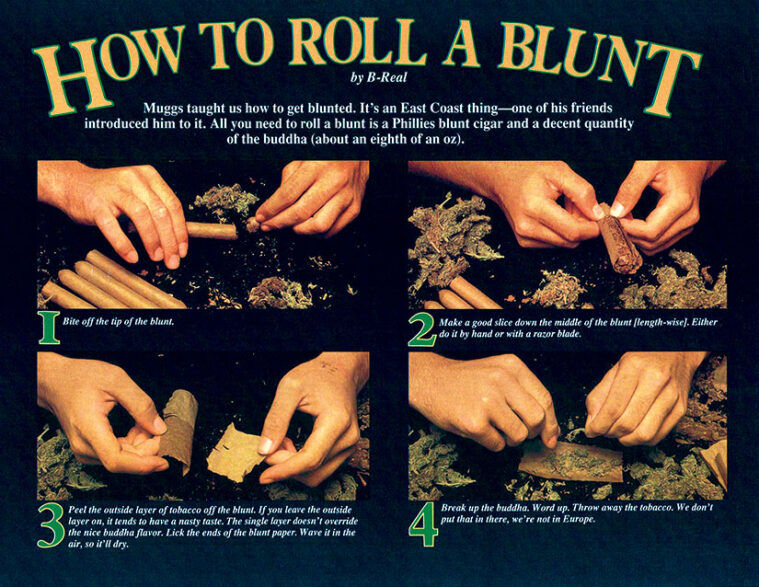
Well received by fans and critics, Cypress Hill’s eponymous debut would eventually be certified double platinum, making them the first Latino rap artist to sell over a million albums. But more importantly, they set a new standard for openly embracing Cannabis in hip-hop — paving the way for Snoop and Dre’s “The Chronic” and the countless other herb-inspired joints to follow.
“Rappers didn’t talk about weed when Cypress Hill came out,” Muggs bragged to Revolver in 2018. “We opened the floodgates.”
Stoned is the Way of the Walk
Cypress didn’t just sing about Cannabis, though — they actually advocated for its legalization, becoming the official “smokes-band” for NORML and learning about the plant’s history and uses from activist icon Jack Herer. In fact, when it came time to release the group’s follow-up album, “Black Sunday,” in July 1993, they included an info sheet of marijuana factoids culled straight from Herer’s groundbreaking book, “The Emperor Wears No Clothes.”
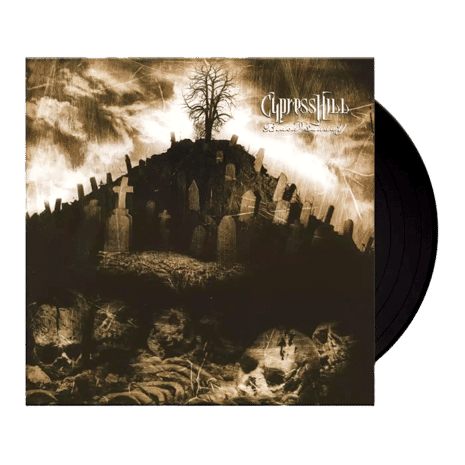
“We always considered ourselves the champions of cannabis culture in terms of hip-hop and mainstream music,” B-Real has said. “We wanted people to know that we weren’t just about smoking, we were about educating people about all aspects of the culture.”
Naturally, “Black Sunday” also featured more classic stoner anthems, including “Hits From the Bong,” “I Wanna Get High” and a brief interlude entitled “Legalize It” that layered quotes from Herer and HT editor Steve Bloom over a funky guitar groove. Cypress’ controversial Cannabis support garnered them a huge following among college kids and a ton of media attention. Thanks in part to this coverage, “Black Sunday” debuted at No. 1 on the Billboard 200 chart, making Cypress Hill the first hip-hop group to have two albums in the Top 10 simultaneously. Selling over a quarter million copies in its first week, it went on to go triple platinum and earn two Grammy nominations.
I Wanna Get High
Riding high on the success of “Black Sunday” and the growing influence of hip-hop, Cypress Hill continued their marijuana-fueled march into mainstream American culture.
Months after the album’s release, the band was booked to perform on the Oct. 2, 1993, episode of “Saturday Night Live.” Though SNL was known for subversive, counterculture humor, Cypress was admonished by numerous network and record company executives not to smoke pot on stage. Nevertheless, when it came time for their second performance, “I Ain’t Goin’ Out Like That,” DJ Muggs “felt like he needed to make a statement.” As the song began, Muggs defied the warnings — announcing: “Yo New York City… they said I couldn’t light my joint … but we ain’t goin’ out like that,” then firing up and puffing on a doobie. As a result, producer Lorne Michaels banned them from the show.
“I was like, ‘Man, fuck them,’” Muggs told Revolt in 2022. “Cause, you know, we were young and aggressive. We really just didn’t give a fuck.”
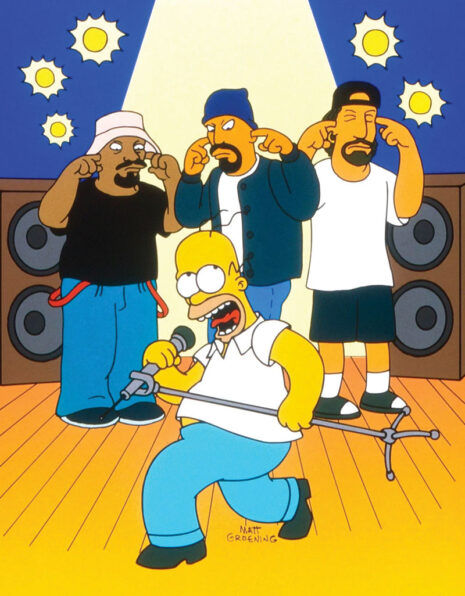
A few years later, Cypress reached an even larger TV audience when they made a guest appearance on another pop culture institution, “The Simpsons.” During the May 19, 1996 episode “Homerpalooza,” an animated version of the trio begins to perform “Throw Your Set in the Air” (from their third album “Temples of Boom”), during which Bart and Lisa notice an odd aroma in the air that “smells like Otto’s jacket.”
There’s also another scene backstage where they’re accused of ordering the London Symphony Orchestra while high, then perform a rendition of “Insane in the Brain” with classical accompaniment (another notorious “Simpsons” prediction that eventually came true when Cypress performed with LSO last July!).
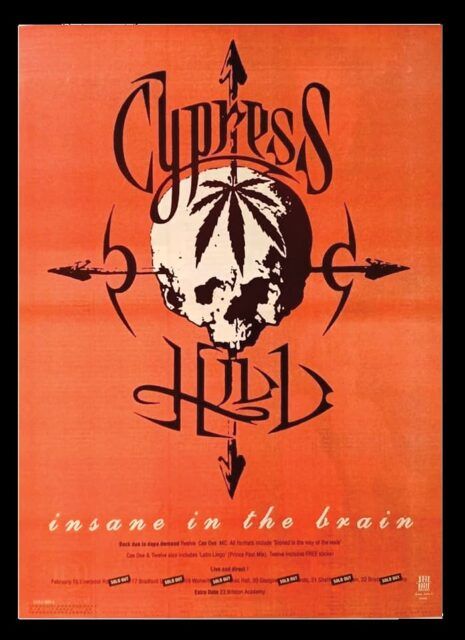
Rap Superstars
Throughout the 1990s, Cypress Hill widened their fanbase by touring with several mega festivals, such as Lollapalooza, H.O.R.D.E., Warped Tour, Smokin’ Grooves, and even Woodstock ’94, where they performed alongside rock icons like Metallica and Aerosmith (and added percussionist Eric “Bobo” Correa to its lineup).
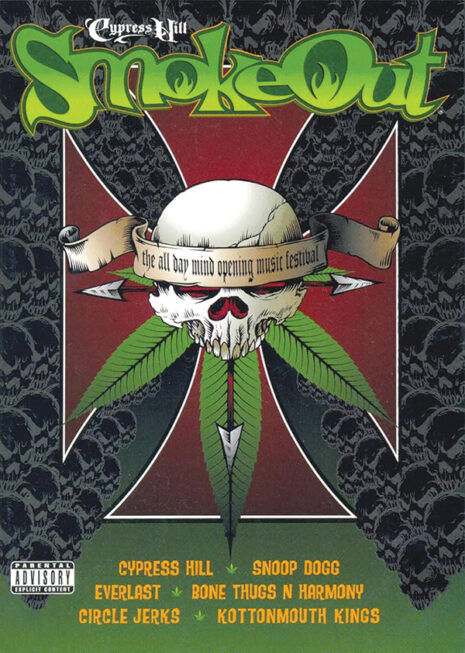
But regardless of where they played or who they played with, Cannabis remained a consistent component of Cypress’ live shows — smoking cartoonishly large joints on stage, encouraging their audience to light up, and even inviting Herer up to drop some knowledge on the crowd before their sets. Then, in 1998, the group founded their own annual marijuana music festival, the Cypress Hill SmokeOut. Hosted by Cheech and Chong, the show featured an array of activist speakers and rap, reggae and metal performers. In 2010, the SmokeOut made history as the first music festival to allow licensed medical marijuana patients to consume their Cannabis legally.
Dr. Greenthumb
Despite several hiatuses to pursue solo and side projects, these Stoned Raiders have continued to crank out groundbreaking ganja-inspired grooves for over three decades — releasing eight more albums featuring numerous other reefer rhymes, including “High Times,” “Ganja Bus” (with Damian Marley), and the hilarious “Dr. Greenthumb,” in which B-Real plays a goofy grow guru sporting a lab coat, stethoscope, afro wig, nerdy glasses and buck teeth.
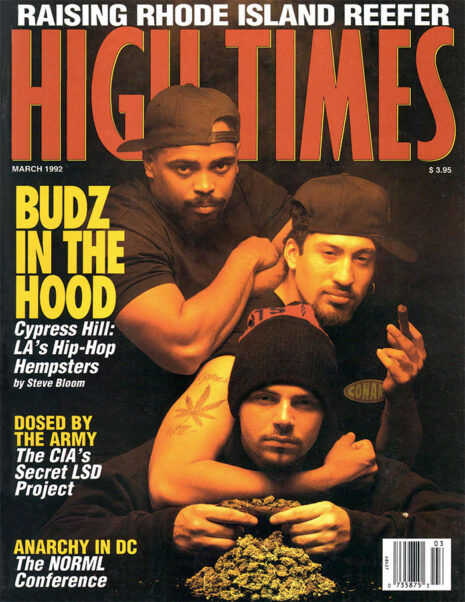
Eventually, B took his commitment to Cannabis — and his wacky alter ego — well beyond the world of music. In 2009, he founded his own streaming network, B-Real TV, where he hosts several podcasts, including “The Dr. Greenthumb Show” (dubbed “The Highest Show in the World”) and “The Smokebox,” where he and various celebrity guests hotbox one of his classic lowriders. In 2018, B opened his first Dr. Greenthumb’s dispensary in Sylmar, California, and has since expanded to seven locations across the state. He’s also launched two Cannabis brands, Dr. Greenthumb and Insane, and a line of glass joint filters called Phuncky Feel Tips.
Ain’t Goin’ Out Like That
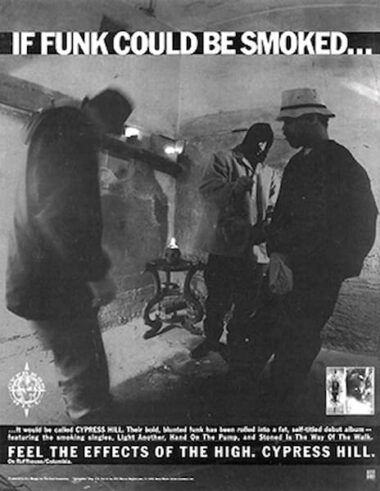
To date, Cypress Hill has sold over 20 million albums worldwide, been nominated for three Grammys, and even been honored with a star on the Hollywood Walk of Fame in 2019. But despite these accomplishments, their greatest impact on our culture is how their music and advocacy have helped lead marijuana into the mainstream acceptance it enjoys today.
“I like to think that Cypress Hill had something to do with changing that culture and that mentality,” Sen Dog once said. “I will forever believe for the rest of my life that Cannabis is actually something that is positive for the earth and positive for human beings.”










